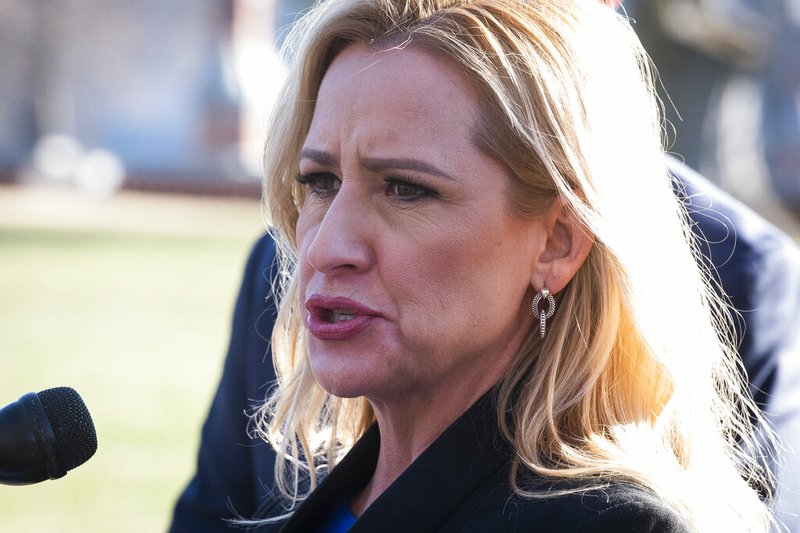Arkansas Attorney General Leslie Rutledge on Monday declined to acknowledge Democrat Joe Biden as the winner of the 2020 presidential election, days after the U.S. Supreme Court declined to take up a lawsuit she and other Republican attorneys general joined challenging the result.
As each state's representatives in the Electoral College met Monday -- voting 306 to 232 in Biden's favor -- Rutledge agreed to an interview with the Arkansas Democrat-Gazette over her participation in the unsuccessful lawsuit seeking the appointment of new electors in four states that voted for Biden.
Asked several times whether her office planned to file or join any additional lawsuits challenging the election result, Rutledge answered each time that her office was not involved in any ongoing litigation. She provided the same response when asked whether she would accept Biden's Electoral College victory.
"At this point, Arkansas is not involved in any lawsuits and we are not involved in any challenges to the Electoral College," Rutledge said.
Rutledge defended her office's participation in the lawsuit that was filed by Texas Attorney General Ken Paxton against the states of Georgia, Michigan, Pennsylvania and Wisconsin. Both Rutledge and Paxton support President Donald Trump, who lost both the popular vote and Electoral College vote to Biden.
On Friday night, the Supreme Court rejected the lawsuit due to lack of standing. Two of the court's conservative justices said they would have accepted the case, while not expressing an opinion of how they would have ruled on the merits.
"I was certainly disappointed in that outcome," Rutledge said Monday afternoon. "I do wish that the court would have heard arguments. This question will likely come up again in the future and I think that it would have been an exemplary case for the court to make this determination, not just for this election but for future elections."
The lawsuit alleged that changes to election procedures in each of those four states as a response to the covid-19 pandemic violated a constitutional clause giving state legislatures authority to establish the manner of holding presidential elections.
Many other states -- including Arkansas -- also took executive action to implement changes to their election procedures.
Attorneys general for the four states named in the lawsuit -- three Democrats and one Republican -- took aim at Paxton's lawsuit last week, describing it as a "publicity stunt," "embarrassing," "uniquely unserious" and "constitutionally, legally and factually wrong."
In a response filed with the Supreme Court last week, Pennsylvania Attorney General Joshua Shapiro, a Democrat, criticized Texas' decision to limit the scope of the lawsuit to just four crucial swing states.
"Given the global pandemic, many States were forced to modify their election procedures," Shapiro wrote. "Texas did. And most, if not every, state has been sued during this election. Texas has."
Shapiro went on to say, "But if such failed and frivolous lawsuits are sufficient to raise a question about the integrity of a state's election -- as Texas argues -- then such an action could be filed against any state in every presidential election."
Asked why the lawsuit was limited to just four swing states, Rutledge repeated specific allegations included in the complaint, such as the extension of mail-in ballot deadlines in Pennsylvania and the use of unmanned drop boxes in Wisconsin.
Later in the interview, when asked why the lawsuit had not included other Biden-voting states that implemented similar measures, Rutledge referred questions to Paxton's office, which drafted the lawsuit.
"We joined a complaint that was already in place, we did not amend the complaint, we did not file our own complaint and so this was a lawsuit that was already in motion," Rutledge said. "And so we said, 'Yes, we will sue those four states along with you, Texas.'"
Pressed to describe her office's process of reviewing the lawsuit before joining it, Rutledge said she had "numerous conversations" with Paxton, but declined to say how long her office vetted the complaint or whether it prepared any legal analysis of the claims made by Paxton.
"I'm not going to get into the specifics that we do on each case or how we determine and how much time and who worked on it," Rutledge said.
The newly elected chairwoman of the Republican Party of Arkansas, Jonelle Fulmer, told the Democrat-Gazette last week that Trump asked her to "relay" to Rutledge that he wished for Arkansas' attorney general to join the lawsuit on the same day that Rutledge signed onto an amicus brief with 16 other state attorneys general. The brief was filed by the state of Missouri.
Gov. Asa Hutchinson told the paper last week that Rutledge had not consulted him prior to her decision to become involved in the lawsuit. Hutchinson, a Republican, has acknowledged Biden's win, calling him "president-elect."
Information for this article was contributed by Frank E. Lockwood of the Arkansas Democrat-Gazette.
